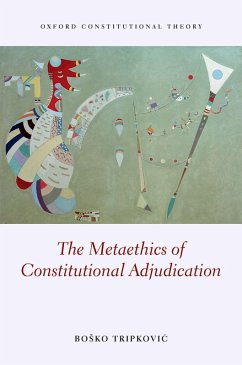In this book Bosko Tripkovic develops a theory of value-based arguments in constitutional adjudication. In contrast to the standard question of constitutional theory that asks whether the courts get moral answers wrong, it asks a more fundamental question of whether the courts get the morality itself wrong. Tripkovic argues for an antirealist conception of value -one that does not presuppose the existence of mind-independent moral truths- and accounts for the effect this ought to have on existing value-based arguments made by constitutional courts. The book identifies three dominant types of value-based arguments in comparative constitutional practice: arguments from constitutional identity, common sentiment, and universal reason, and explains why they fail as self-standing approaches to moral judgment. It then suggests that the appropriate moral judgments emerge from the dynamics between practical confidence, which denotes the inescapability of the self and the evaluative attitudes it entails, and reflection, which denotes the process of challenging and questioning these attitudes. The book applies the notions of confidence and reflection to constitutional reasoning and maintains that the moral inquiry of the constitutional court ought to depart from the emotive intuitions of the constitutional community and then challenge these intuitions through reflective exposure to different perspectives in order to better understand and develop the underlying constitutional identity. The book casts new light on common constitutional dilemmas and allows us to envisage new ways of resolving them.
Dieser Download kann aus rechtlichen Gründen nur mit Rechnungsadresse in A, B, BG, CY, CZ, D, DK, EW, E, FIN, F, GR, HR, H, IRL, I, LT, L, LR, M, NL, PL, P, R, S, SLO, SK ausgeliefert werden.


